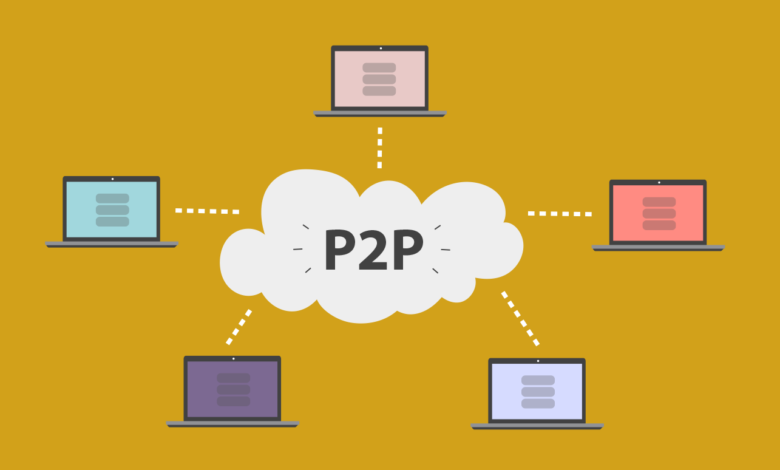The Role of Cryptocurrency in Peer-to-Peer Payments

Table of Contents
In recent years, the global financial landscape has undergone a profound transformation with the emergence of cryptocurrencies. These digital, decentralized forms of currency have not only captured the imagination of tech enthusiasts and investors but have also begun to reshape the fundamental nature of peer-to-peer payments.
The traditional intermediaries that once facilitated these transactions are now being challenged by the innovative potential of cryptocurrencies, promising faster, more secure, and cost-effective peer-to-peer payment solutions. This article delves into the intricate interplay between cryptocurrencies and peer-to-peer payments, exploring their role in revolutionizing the way individuals and businesses exchange value, while also addressing the opportunities, challenges, and implications that this disruptive technology introduces to the realm of modern finance.
Unleashing Financial Freedom: Exploring Cryptocurrency’s Revolutionary Role in Peer-to-Peer Payments
In recent years, the financial landscape has witnessed a profound transformation with the advent of cryptocurrencies. One of the most groundbreaking aspects of this digital revolution is its impact on peer-to-peer (P2P) payments. Cryptocurrencies, like Bitcoin, Ethereum, and numerous altcoins, have opened the door to an entirely new way of conducting financial transactions directly between individuals, without the need for intermediaries such as banks or payment processors.
At the heart of cryptocurrency’s role in P2P payments is the underlying technology known as blockchain. A blockchain is a decentralized and immutable digital ledger that records all transactions transparently and securely. When a P2P payment is initiated using a cryptocurrency, the transaction is verified by a network of participants (nodes) and added to the blockchain. This eliminates the need for a central authority to validate and process transactions, reducing delays and fees associated with traditional payment methods.
The revolutionary aspect of cryptocurrency in P2P payments lies in its ability to transcend borders and traditional financial barriers. Individuals can send and receive funds across the globe without the constraints of currency conversion and international transfer fees. This has significant implications for remittances, cross-border trade, and even charitable donations, where the funds can reach their intended recipients with unprecedented speed and efficiency.
Furthermore, the security and privacy features inherent to many cryptocurrencies enhance the safety of P2P transactions. Transactions are pseudonymous, meaning they are associated with cryptographic addresses rather than real-world identities. While this adds a layer of privacy, it’s important to note that transactions are still traceable on the blockchain, ensuring a degree of accountability.
Cryptocurrencies also empower individuals who lack access to traditional banking services. In many parts of the world, especially in underbanked or unbanked regions, cryptocurrency wallets and smartphones are becoming the tools for financial inclusion. This shift is redefining financial freedom, giving people control over their assets and financial interactions like never before.
In conclusion, the revolutionary role of cryptocurrency in peer-to-peer payments is reshaping the way individuals engage in financial transactions. Through blockchain technology, cryptocurrencies offer borderless, secure, and efficient means of transferring value directly between parties. As the adoption of cryptocurrencies continues to grow, it is evident that they are unlocking new dimensions of financial freedom and reshaping the future of payments.

Cryptocurrency Chronicles: How Digital Coins Are Transforming Peer-to-Peer Transactions
The advent of cryptocurrencies has ushered in a new era of peer-to-peer (P2P) transactions, revolutionizing the way people exchange value. Unlike traditional financial systems that rely on intermediaries, cryptocurrencies enable individuals to engage in direct and secure transactions across the digital realm.
At the core of this transformation is the concept of decentralization. Cryptocurrencies operate on decentralized networks, often utilizing blockchain technology. A blockchain is a distributed and immutable ledger that records all transactions. When a P2P transaction occurs using a cryptocurrency, it is validated by a network of computers, or nodes, and added to the blockchain. This decentralized validation process ensures transparency, security, and trust in every transaction.
One of the key advantages of cryptocurrencies in P2P transactions is the removal of intermediaries. In traditional financial systems, banks, payment processors, and other third parties facilitate transactions, often leading to delays, fees, and privacy concerns. Cryptocurrencies eliminate the need for these intermediaries, enabling individuals to directly send and receive funds without unnecessary hurdles.
Moreover, cryptocurrencies offer unparalleled speed and efficiency in P2P transactions. Traditional cross-border transactions can take days to complete, involving multiple banks and currency conversions. In contrast, cryptocurrencies enable near-instantaneous transfers across borders, making them particularly valuable for global transactions and remittances.
Security is another critical aspect of cryptocurrency-driven P2P transactions. Cryptocurrencies use advanced cryptographic techniques to secure transactions and wallets. This significantly reduces the risk of fraud and unauthorized access, providing users with greater peace of mind when conducting P2P transactions.
It’s important to note that while cryptocurrencies offer numerous benefits, they also present challenges and considerations. Price volatility, regulatory uncertainties, and the potential for misuse have sparked ongoing discussions and debates. Additionally, the irreversible nature of cryptocurrency transactions emphasizes the importance of accurate and careful transaction details.
Also read: Aether Smart Contracts: Enabling Trustless Transactions
Breaking Barriers: The Empowering Influence of Cryptocurrency on Peer-to-Peer Payments
Cryptocurrencies have emerged as a transformative force, breaking down traditional barriers and empowering individuals in the realm of peer-to-peer (P2P) payments. These digital assets are revolutionizing the way people transact, offering a myriad of benefits that extend beyond conventional financial systems.
One of the most impactful aspects of cryptocurrencies is their borderless nature. Traditional cross-border transactions often involve convoluted processes, including currency conversion, intermediary banks, and international fees. Cryptocurrencies sidestep these hurdles, allowing individuals to engage in seamless P2P transactions across geographical boundaries. This is particularly valuable for global trade, remittances, and collaborations that require swift and direct payments.
The empowering influence of cryptocurrencies is magnified by their accessibility. In many parts of the world, traditional banking services remain out of reach for a significant portion of the population. Cryptocurrencies provide an alternative path to financial inclusion. Anyone with an internet connection can create a cryptocurrency wallet and become part of the global economy, transcending socio-economic limitations and offering a sense of economic agency to those who previously lacked it.
Moreover, cryptocurrencies enhance privacy and security in P2P transactions. Traditional financial systems often expose sensitive personal and financial information during transactions. Cryptocurrencies, on the other hand, employ cryptographic techniques to ensure secure and private transfers. While transactions are recorded on the blockchain for transparency, the parties involved are pseudonymous, reducing the risk of identity theft and fraud.
The decentralized nature of cryptocurrencies is a driving force behind their ability to empower individuals in P2P payments. Decentralization means that no single entity has control over the network, mitigating the risks associated with central points of failure. This empowers users with a level of control over their funds and transactions that was previously unimaginable in traditional financial systems.
However, as with any innovation, cryptocurrencies come with their own set of challenges. Price volatility, regulatory uncertainties, and the potential for misuse have raised important considerations. Additionally, educating users about responsible and secure cryptocurrency usage is crucial to ensure the widespread benefits of this technology.
Decentralized Dollars: A Comprehensive Analysis of Cryptocurrency’s Impact on Peer-to-Peer Transactions
In recent years, the rise of cryptocurrencies has sparked a revolutionary shift in the world of finance and peer-to-peer transactions. Cryptocurrencies, such as Bitcoin and Ethereum, have introduced a groundbreaking concept: decentralized digital currencies that enable direct, peer-to-peer transactions without the need for intermediaries like banks or financial institutions. This comprehensive analysis delves into the profound impact of cryptocurrencies on peer-to-peer transactions and explores the key drivers behind their adoption.
Traditionally, peer-to-peer transactions have relied on centralized systems, which often involve delays, fees, and potential privacy concerns. Cryptocurrencies address these challenges by leveraging blockchain technology – a decentralized and transparent ledger system that ensures secure and verifiable transactions. This analysis examines the mechanics of blockchain and how it underpins the seamless execution of peer-to-peer transactions, providing participants with increased control, security, and efficiency.
Furthermore, this analysis explores the economic implications of cryptocurrencies in peer-to-peer transactions. It delves into the potential for financial inclusion, especially in regions with limited access to traditional banking services. By enabling individuals to participate in the global economy through cryptocurrency transactions, new opportunities for economic empowerment and poverty reduction emerge.
The analysis also scrutinizes the challenges and hurdles that cryptocurrencies face in becoming a mainstream medium of peer-to-peer exchange. Regulatory concerns, scalability issues, and the volatility of cryptocurrency values are among the key obstacles explored in this examination.
Ultimately, “Decentralized Dollars” presents a comprehensive overview of how cryptocurrencies are reshaping the landscape of peer-to-peer transactions, fostering financial inclusivity, and challenging conventional notions of currency and exchange.

From Bitcoin to Beyond: Understanding Cryptocurrency’s Evolution and Significance in Peer-to-Peer Payments
The inception of Bitcoin in 2009 marked the birth of a new era in financial technology. Since then, the cryptocurrency ecosystem has rapidly evolved, giving rise to a multitude of digital assets and redefining the way peer-to-peer payments are conducted. This exploration traces the journey from Bitcoin’s pioneering concept to the broader significance of cryptocurrencies in reshaping peer-to-peer payments.
Bitcoin, as the first decentralized cryptocurrency, introduced the concept of a trustless and tamper-proof ledger through blockchain technology. Its significance lies not only in enabling secure peer-to-peer transactions but also in challenging the traditional financial infrastructure by providing an alternative store of value and a hedge against inflation.
As the cryptocurrency landscape expanded, alternative cryptocurrencies, often referred to as altcoins, emerged. Each with its unique features and use cases, these digital assets aimed to address limitations observed in Bitcoin, such as scalability and transaction speed. Ethereum, for instance, introduced the concept of smart contracts, enabling self-executing agreements with profound implications for peer-to-peer transactions.
This examination also delves into the rise of decentralized finance (DeFi) and its impact on peer-to-peer payments. DeFi platforms leverage blockchain to create a variety of financial services, including lending, borrowing, and trading, all executed without intermediaries. The intersection of DeFi and cryptocurrencies is reshaping the way individuals access and manage their finances, granting unprecedented autonomy and control.
However, with innovation comes challenges. Regulatory considerations, security vulnerabilities, and the need for interoperability between different cryptocurrency systems are explored as pivotal factors in shaping the trajectory of cryptocurrencies in peer-to-peer payments.
In essence, “From Bitcoin to Beyond” offers a comprehensive understanding of how cryptocurrencies have evolved and their profound significance in redefining peer-to-peer payments, paving the way for a decentralized and inclusive financial future.
Peer-to-Peer Reinvented: Navigating the Landscape of Cryptocurrency-Driven Payment Systems
In the era of digital transformation, traditional payment systems are undergoing a significant revolution with the advent of cryptocurrencies. “Peer-to-Peer Reinvented” delves into the dynamic landscape of payment systems, focusing on how cryptocurrencies are at the forefront of this reinvention, challenging conventional notions of value exchange.
The heart of this exploration lies in dissecting the mechanics of cryptocurrency-driven payment systems. These systems leverage blockchain technology to facilitate direct transactions between users, eliminating intermediaries and the associated fees and delays. The analysis provides an in-depth understanding of how cryptographic principles, consensus mechanisms, and decentralized ledgers work in harmony to ensure the security and immutability of transactions.
A key highlight of this examination is the emergence of stablecoins – cryptocurrencies designed to minimize price volatility by pegging their value to real-world assets, such as fiat currencies or commodities. Stablecoins offer the benefits of cryptocurrencies, such as fast cross-border transfers and reduced transaction costs, while mitigating the challenges posed by the fluctuating values of traditional cryptocurrencies like Bitcoin.
The reinvention of peer-to-peer payments is also intricately linked with the concept of tokenization. This analysis uncovers how tokenization of assets, whether physical or digital, is revolutionizing ownership, transferability, and liquidity. Tokenized assets can represent anything from real estate to art, enabling fractional ownership and democratizing access to traditionally illiquid markets.
Amid the transformative potential, this exploration addresses the regulatory and security considerations surrounding cryptocurrency-driven payment systems. It examines the role of governments and regulatory bodies in shaping the landscape, as well as the measures taken to ensure the protection of user funds and data in a decentralized environment.
Also read: Exploring the Potential of Aether: Decentralized Finance and Beyond
FAQS
Q: What is the role of cryptocurrency in peer-to-peer payments?
A: Cryptocurrency serves as a digital medium of exchange that allows direct, secure, and decentralized transactions between individuals without the need for intermediaries like banks.
Q: How does cryptocurrency facilitate peer-to-peer payments?
A: Cryptocurrencies utilize blockchain technology to record and verify transactions. This enables users to send funds directly to one another’s digital wallets, ensuring transparency and security.
Q: What are the advantages of using cryptocurrency for peer-to-peer payments?
A: Cryptocurrency offers fast and borderless transactions, lower fees compared to traditional methods, and increased privacy since transactions don’t necessarily reveal personal information.
Q: Are there any challenges associated with using cryptocurrency for peer-to-peer payments?
A: Yes, challenges include price volatility, regulatory uncertainties, potential for irreversible transactions, and the need for both parties to have a basic understanding of cryptocurrency usage.
Q: What role do digital wallets play in cryptocurrency peer-to-peer payments?
A: Digital wallets store the private keys necessary for accessing and managing one’s cryptocurrency holdings, allowing users to send and receive funds securely.
Q: Can cryptocurrency be used for everyday purchases in a peer-to-peer context?
A: Yes, some cryptocurrencies are designed for everyday transactions, and merchants increasingly accept them as payment. However, adoption and usability can vary.
Q: How does cryptocurrency compare to traditional peer-to-peer payment methods like cash or bank transfers?
A: Cryptocurrency offers advantages such as faster cross-border transactions, reduced fees, and potential for increased financial inclusion, but it also comes with technological and regulatory complexities.
Q: Can you give an example of a popular cryptocurrency used for peer-to-peer payments?
A: Bitcoin is one of the most well-known cryptocurrencies used for peer-to-peer transactions, allowing users to send funds directly without intermediaries.
Q: What impact could cryptocurrency have on financial inclusion through peer-to-peer payments?
A: Cryptocurrency has the potential to provide financial services to individuals who lack access to traditional banking, enabling them to participate in the global economy.
Q: Is the use of cryptocurrency for peer-to-peer payments secure?
A: Cryptocurrency transactions are secure due to blockchain encryption, but users must still exercise caution against potential hacking, scams, and phishing attacks.
Q: How might the future of peer-to-peer payments be influenced by cryptocurrency developments?
A: The ongoing evolution of cryptocurrency technology and regulatory frameworks could lead to increased adoption of digital currencies for peer-to-peer transactions, potentially reshaping the financial landscape.




